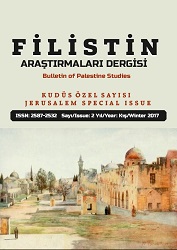İsrail Tarih Ders Kitaplarının (1948-2014) Gözünden Selçuklular: Filistin-Kudüs Hâkimiyetleri ve Haçlı Seferleri ile Cihat Hareketinin Başlangıcındaki Rolleri
THE SELJUKS IN THE VIEW OF ISRAELI HISTORY TEXTBOOKS (1948-2014): THEIR RULE IN PALESTINE AND JERUSALEM AND THEIR ROLE IN THE LAUNCHING OF THE CRUSADES AND THE JIHAD MOVEMENT
Author(s): Selim TezcanSubject(s): History, Social Sciences, Education, School education, History of Education, Sociology of Education
Published by: Muhammed Mustafa KULU
Keywords: Israel; History Textbooks; Seljuks; Jerusalem; Crusades;
Summary/Abstract: This study aims to investigate how the history of the Seljuks, their rule in Palestine and Jerusalem, and their role in the launching of the Crusades and the jihad movement have been covered in the Hebrew and Arabic history textbooks published until today in Israel. Differently from the books in Arabic, almost none of the Hebrew books cover Seljuk history as a topic independent of the Crusades. When they touch upon it within the Crusading context, they attribute the launching of the Crusades to the Seljuks’ oppression of the Christians in the newly conquered Palestine and Jerusalem. Most Arabic books do not adopt this line of explanation, and tend to emphasize the material motives of the Crusaders. The negative view of the Seljuks evident in the Hebrew books also finds reflection in their argument that the establishment of Seljuk rule over Syria and Palestine led to a sharp rupture in the Christian-Muslim relations and in the Mediterranean trade, and that the situation improved only through the arrival of the Crusaders. This line of argument is similarly absent from the Arabic books. The books in Hebrew and Arabic also cover the struggles of Zangi and Nur al-Din Mahmud against the Crusaders. While some books in Hebrew adopt a critical line of approach, arguing that the Zangids used the jihad movement to expand their power over the other Muslim principalities, the Arabic books content themselves with praising both leaders as the originators of the movement.
Journal: FİLİSTİN ARAŞTIRMALARI DERGİSİ
- Issue Year: 2017
- Issue No: 2
- Page Range: 103-133
- Page Count: 31
- Language: Turkish

